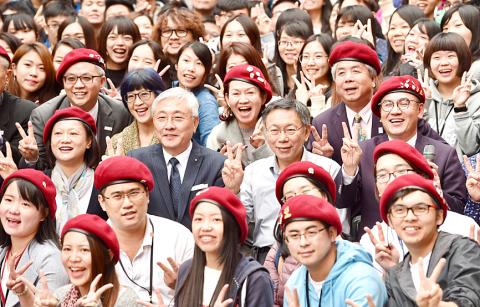Taipei Mayor Ko Wen-je (柯文哲) yesterday said the widening gap between the rich and poor must be solved through taxation and social welfare, but annual local government subsidies to elderly residents to mark the Double Ninth Festival is not the solution.
Ko made the remark after he was questioned by reporters following his speech to a Rotary International youth leadership camp in Taipei yesterday afternoon, when he was asked about a comment he made in September comparing local governments’ cash subsidies to elderly people to buying votes.
Citing French economist Thomas Piketty’s book Capital in the Twenty-First Century, Ko said earning money with money is faster than earning money with labor, and that is why the gap between rich and poor is widening.

Photo: Peter Lo, Taipei Times
The government can solve the problem in two ways: imposing progressive taxes on the rich or establishing a social welfare system that takes care of minority groups and elderly people, the mayor said.
“Normally, NT$1,500 is given to each elderly person, regardless of individual requirements and situations. However, when money is spent, government policy should have a guiding effect. For example, the government could issue seniors with transit cards providing NT$480 per month for public transportation fares to encourage people to get out and participate in activities,” he said.
“Taipei is the only one [local government] not to give out cash subsidies, but other cities and counties giving out cash does not mean that it is the right thing to do,” he said.
Money should be spent in a way that achieves the greatest benefits, he said.
Subsidies for children are given out after reviewing household income and household registry locations, which means equal amounts are not given to everyone, the mayor said.
Cash for elderly people should not be handed out in equal amounts for everyone, he said, adding that improving the long-term care system is more important than handing out money.
Rotary International is scheduled to hold its 2021 annual convention in Taipei, with more than 40,000 people from more than 100 nations expected to visit for the meeting.
Rotary members asked Ko what type of city he would like to present to visitors if he is re-elected next year.
“With [so many] foreign visitors coming to Taipei, of course we want to make a fortune by having them max out their credit cards,” Ko joked.
The city has three years to prepare for the event and it will establish an ad hoc group to handle those preparations, he said.

The US government has signed defense cooperation agreements with Japan and the Philippines to boost the deterrence capabilities of countries in the first island chain, a report by the National Security Bureau (NSB) showed. The main countries on the first island chain include the two nations and Taiwan. The bureau is to present the report at a meeting of the legislature’s Foreign Affairs and National Defense Committee tomorrow. The US military has deployed Typhon missile systems to Japan’s Yamaguchi Prefecture and Zambales province in the Philippines during their joint military exercises. It has also installed NMESIS anti-ship systems in Japan’s Okinawa

‘WIN-WIN’: The Philippines, and central and eastern European countries are important potential drone cooperation partners, Minister of Foreign Affairs Lin Chia-lung said Minister of Foreign Affairs Lin Chia-lung (林佳龍) in an interview published yesterday confirmed that there are joint ventures between Taiwan and Poland in the drone industry. Lin made the remark in an exclusive interview with the Chinese-language Liberty Times (the Taipei Times’ sister paper). The government-backed Taiwan Excellence Drone International Business Opportunities Alliance and the Polish Chamber of Unmanned Systems on Wednesday last week signed a memorandum of understanding in Poland to develop a “non-China” supply chain for drones and work together on key technologies. Asked if Taiwan prioritized Poland among central and eastern European countries in drone collaboration, Lin

ON ALERT: Taiwan’s partners would issue warnings if China attempted to use Interpol to target Taiwanese, and the global body has mechanisms to prevent it, an official said China has stationed two to four people specializing in Taiwan affairs at its embassies in several democratic countries to monitor and harass Taiwanese, actions that the host nations would not tolerate, National Security Bureau (NSB) Director-General Tsai Ming-yen (蔡明彥) said yesterday. Tsai made the comments at a meeting of the legislature’s Foreign Affairs and National Defense Committee, which asked him and Minister of National Defense Wellington Koo (顧立雄) to report on potential conflicts in the Taiwan Strait and military preparedness. Democratic Progressive Party (DPP) Legislator Michelle Lin (林楚茵) expressed concern that Beijing has posted personnel from China’s Taiwan Affairs Office to its

BACK TO WORK? Prosecutors said they are considering filing an appeal, while the Hsinchu City Government said it has applied for Ann Kao’s reinstatement as mayor The High Court yesterday found suspended Hsinchu mayor Ann Kao (高虹安) not guilty of embezzling assistant fees, reducing her sentence to six months in prison commutable to a fine from seven years and four months. The verdict acquitted Kao of the corruption charge, but found her guilty of causing a public official to commit document forgery. The High Prosecutors’ Office said it is reviewing the ruling and considering whether to file an appeal. The Taipei District Court in July last year sentenced Kao to seven years and four months in prison, along with a four-year deprivation of civil rights, for contravening the Anti-Corruption